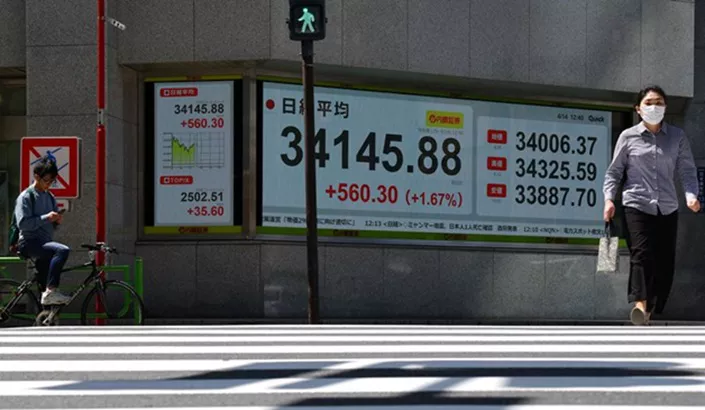Asian stocks saw modest gains on Thursday, while the U.S. dollar strengthened slightly as investors focused on ongoing trade negotiations between the U.S. and Japan. Despite the uncertainty surrounding President Donald Trump’s tariff policies, which have kept market sentiment fragile, traders remained hopeful.
Federal Reserve Chairman Jerome Powell’s warning about the economic risks of tariffs—citing slower growth and rising prices—also weighed on the market. Meanwhile, gold prices continued to climb to record highs as investors sought safety amid the uncertainty.
Technology shares remained in focus after a rough day on Wednesday, following warnings from major companies like Nvidia and ASML. Investors are also waiting for earnings reports from Taiwan Semiconductor Manufacturing Company (TSMC).
Japan’s Nikkei index rose by 0.7%, with the yen weakening as the U.S. and Japan kicked off trade talks. President Trump, who unexpectedly joined the discussions, called the talks “big progress.”
Charu Chanana, Chief Investment Strategist at Saxo, pointed out that markets are showing renewed optimism, with trade talks between the U.S. and Japan and China’s willingness to engage in discussions fueling hopes, especially in trade-sensitive markets.
In Asia, stock markets showed mixed results. While South Korea’s benchmark index rose by 0.7%, Taiwan’s stocks fell by 0.5%. European futures signaled a slow start.
Powell also indicated that the Fed would wait for more data before making any changes to interest rates. Tom Graff, Chief Investment Officer at Facet, commented that the Fed is caught in a difficult situation, unable to take proactive action due to the risk of inflation from tariffs.
Investors are closely watching earnings forecasts from Taiwan Semiconductor Manufacturing Company to gauge the health of the chip industry. Global chip stocks took a hit on Wednesday after ASML warned that tariffs are adding uncertainty to its outlook for 2025 and 2026.
Adding to the pressure, Nvidia warned of a $5.5 billion loss after Washington restricted exports of its AI processors to China. Chris Zaccarelli, Chief Investment Officer at Northlight Asset Management, noted that if a recession occurs, chipmakers would suffer, with lower demand possibly caused by tariffs or other short-term barriers.
Chinese stocks were cautious on Thursday, with the blue-chip stock index barely changing, while Hong Kong’s Hang Seng index rose by 1.6%, led by a rebound in tech shares.
Investor focus remains on the evolving trade policies under Trump, as markets await new agreements between the U.S. and its trading partners. The uncertainty has put pressure on the dollar, with investors pulling back from U.S. assets like Treasuries. However, Treasuries have stabilized this week, with the benchmark 10-year U.S. Treasury yield rising by 3 basis points to 4.311%.
The euro dipped 0.3% to $1.1367, just below last week’s three-year high ahead of the European Central Bank’s expected rate cut. The dollar index, which measures the U.S. dollar against six other currencies, was slightly higher at 99.562.
In commodity markets, gold continued to shine, hitting a record high of $3,357.40 per ounce, driven by safe-haven demand. Oil prices also rose, supported by the prospect of tighter supply. Brent crude futures gained 0.93%, reaching $66.46 per barrel, while U.S. West Texas Intermediate crude rose by more than 1% to $63.2 per barrel.
Related Topics:


